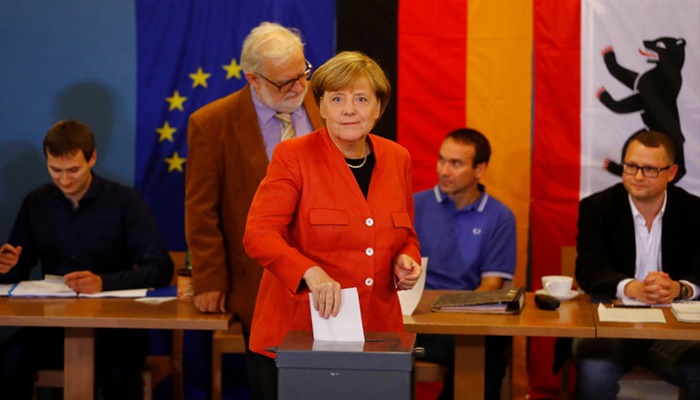
Angela Merkel has won a fourth term as German Chancellor, but with her party’s lead in parliament cut and the country facing a surge in support for the far right.
Exit polls predicted the hard-right Alternative for Germany (AfD) would become the third-largest group in the national parliament, the Bundestag, as German voters delivered a stinging blow to the traditional parties.
Merkel’s center-right CDU and its sister CSU had their share of the vote slashed. Germany’s oldest party, the center-left SPD, which had been in a “grand coalition” with Merkel, was consigned to opposition.
Addressing her supporters, a subdued Merkel said the result gave her a “mandate” to govern but that the AfD’s success would require “thorough analysis” to understand the concerns of their voters.
SPD leader Martin Schulz said the result was a “bitter disappointment” and the party would return to opposition.
The exit polls showed Merkel’s CDU/CSU group would be the largest in the Bundestag, but with its lead cut to 33.5% of the seats, down from 41.5%. The SPD fell to 21% from 25.7%, a result met with shock at the party’s headquarters.
The AfD, founded only four years ago, became the first far-right party to enter the Bundestag since 1960, with a seat projection of 13%, according to FORSA polling institute data commissioned by German public broadcaster ZDF.
Addressing her supporters, Merkel pledged to try and understand the concerns of voters who lent their support to the AfD. “There’s a big new challenge for us, and that is the entry of the AfD in the Bundestag,” she said. “We want to win back AfD voters.”
Licking its wounds, the SPD decided against continuing in government. During the campaign, Schulz found it hard to mount an effective opposition to Merkel, as his party had been inextricably linked to her policy decisions. More symbolically, had the SPD remained in coalition, the AfD would have been the largest opposition party.
Rise of AfD
The AfD’s local party leader in Berlin, Georg Pazderski, declared its success a “political earthquake.”
Founded in 2013, the AfD rose to prominence on the back of an anti-immigration stance and its opposition to Merkel’s decision to open the country’s borders to over a million migrants, mainly those fleeing violence and persecution from the Middle East. The party’s opponents say it has stoked Islamophobia in Germany.
The AfD polled particularly strongly in East Germany, which includes Berlin, attracting 21.5% of the vote, according to exit polling conducted by by Infratest Dimap. In the West, it scored about 11%, the projections said. The results put the AfD on course to become the second largest party in the East, after the CDU.
“For the first time, we have a conservative party right beside our Christian Democrats and this is because they moved more and more to the left and we moved into the vacuum,” Pazderski told CNN.
Alice Weidel, a leading AfD figure, told supporters she would keep her promise to call for a committee to investigate Merkel’s decision to allow more than a million refugees into the country in 2015.
She had repeatedly claimed that Merkel should be “punished” for her decisions during the refugee crisis. “People have given us their trust and we will keep our promise,” she said.
There were protests outside the party’s headquarters in Berlin after the provisional results came through on Sunday. Protesters chanted “Nazis out” and sang “say it loud, say it clear, refugees are welcome here.”
The European Jewish Congress called on the major parties to shun the AfD in parliament. “We trust that centrist parties in the Bundestag will ensure that the AfD has no representation in the coming governing coalition,” Dr. Moshe Kantor, President of the EJC, said.
“Some of the positions it has espoused during the election campaign display alarming levels of intolerance not seen in Germany for many decades and which are, of course, of great concerns to German and European Jews.”
With the SPD refusing to rejoin government and no party willing to work with the AfD, the result leaves Merkel with few options for a coalition.
Merkel may be forced to make a deal with the Green Party and FDP, to create a so-called “Jamaican coalition” — with the green and and yellow of the two parties combining with the black of the CDU to resemble the flag of Jamaica.
The pro-business FDP are expected to take 10% of seats with the Greens one percentage point behind on nine.
Coalition talks are unlikely to begin in earnest until final results have been announced on Monday.
To form a government, the parties involved must have a combined total of at least 50% of the seats in parliament. There are likely to be several coalition options, and plenty of disagreement between the parties before they reach a deal.
The Bundestag is due reconvene on October 24 with the new government in place.
Credit: CNN






